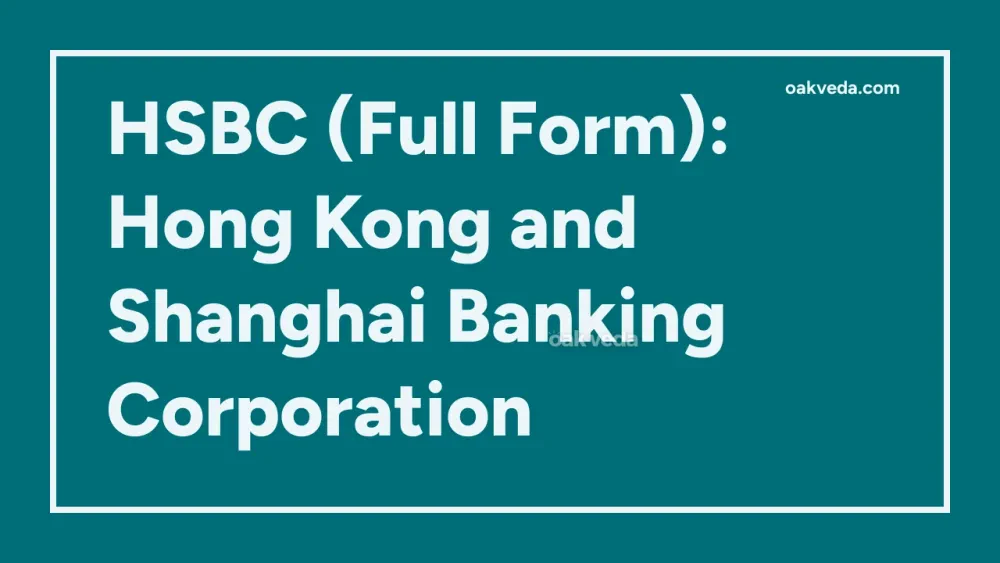
What is the Full Form of HSBC?
The full form of HSBC is Hong Kong and Shanghai Banking Corporation. This renowned financial institution has grown from its roots in Asia to become one of the world's largest banking and financial services organizations.
What is Hong Kong and Shanghai Banking Corporation?
Hong Kong and Shanghai Banking Corporation, commonly known as HSBC, is a British multinational banking and financial services company. It operates as one of the largest and most influential financial institutions globally, offering a wide range of services including retail banking, corporate finance, investment banking, and wealth management.
Origin and Development of HSBC
The history of HSBC dates back to the 19th century:
- Founded on March 3, 1865, by Scottish banker Thomas Sutherland in Hong Kong, then a British colony
- Officially established as HSBC on August 14, 1866, under Hong Kong legislation
- Expanded rapidly, reaching 16 countries by 1900 under the leadership of Chief Manager Thomas Jackson
- Diversified services to include bullion trading, merchant banking, and government loans
- Acquired Marine Midland Corporation in the 1980s, marking its entry into the US market
- Formed HSBC Holdings plc in 1991, moving its headquarters to London
- Adopted its current hexagon logo and HSBC branding in 1998
How does HSBC work?
HSBC operates through a network of branches, subsidiaries, and affiliates across 64 countries and territories. The bank's operations are divided into several key areas:
- Retail Banking and Wealth Management
- Commercial Banking
- Global Banking and Markets
- Global Private Banking
These divisions work together to provide comprehensive financial solutions to individuals, businesses, and institutions worldwide.
Types of HSBC Services
HSBC offers a wide array of financial products and services:
Personal Banking
- Savings and checking accounts
- Debit and credit cards
- Fixed deposits
- Mortgages and personal loans
- Investment and insurance products
Business Banking
- Business accounts and lending
- Trade finance and receivables finance
- Treasury and cash management
- Commercial real estate
Corporate and Institutional Banking
- Capital financing
- Securities services
- Global liquidity and cash management
- Global trade and receivables finance
Functions of HSBC
As a global financial institution, HSBC performs several crucial functions:
- Financial Intermediation: Connecting savers with borrowers and facilitating the flow of capital
- Risk Management: Offering products to help clients manage financial risks
- Payment Services: Providing efficient local and international payment systems
- Wealth Management: Assisting clients in growing and preserving their wealth
- Economic Development: Supporting businesses and contributing to economic growth in various regions
Applications of HSBC Services
HSBC's services find applications across various sectors and customer segments:
- Individuals: Personal banking, mortgages, investments, and retirement planning
- Small Businesses: Start-up funding, working capital, and expansion financing
- Corporations: Mergers and acquisitions, capital raising, and treasury management
- Governments: Sovereign debt issuance and infrastructure financing
- Non-profit Organizations: Specialized banking services and fundraising support
Features of HSBC
HSBC distinguishes itself through several key features:
- Global Presence: Operations in major financial centers and emerging markets
- Digital Banking: Advanced online and mobile banking platforms
- Sustainability Focus: Commitment to sustainable finance and environmental initiatives
- Cultural Diversity: A workforce representing various nationalities and backgrounds
- Innovation: Investment in fintech and digital transformation
Benefits of HSBC
Customers and stakeholders benefit from HSBC in numerous ways:
- Access to a wide range of financial products and services
- Global network facilitating international banking and trade
- Expertise in emerging markets and cross-border transactions
- Strong financial stability and risk management practices
- Innovative digital banking solutions for convenience and efficiency
Limitations or Challenges of HSBC
Despite its strengths, HSBC faces several challenges:
- Regulatory scrutiny and compliance costs in multiple jurisdictions
- Competition from fintech companies and digital-only banks
- Geopolitical risks due to its global presence
- Pressure to improve returns and streamline operations
- Balancing growth with environmental and social responsibilities
Future Developments in HSBC Technology
HSBC is investing heavily in technology to shape its future:
- Artificial Intelligence and Machine Learning for improved customer service and risk management
- Blockchain technology for more efficient cross-border transactions
- Enhanced cybersecurity measures to protect customer data
- Open Banking initiatives to foster innovation and partnerships
- Cloud computing for scalability and cost-efficiency
FAQs on HSBC Full Form
-
What does the HSBC logo represent? The HSBC hexagon logo is derived from the company's original house flag, which featured the cross of St. Andrew.
-
In how many countries does HSBC operate? As of 2023, HSBC operates in 64 countries and territories across Europe, Asia, North America, Latin America, and the Middle East.
-
Is HSBC a Chinese bank? No, HSBC is a British multinational bank. While it has strong historical ties to Hong Kong and China, its headquarters are in London, UK.
-
What is HSBC's tagline? HSBC's current tagline is "Together we thrive," emphasizing its commitment to partnership and mutual growth.
-
Does HSBC offer Islamic banking services? Yes, HSBC provides Islamic banking services in several countries, operating under the name HSBC Amanah.
In conclusion, the full form of HSBC - Hong Kong and Shanghai Banking Corporation - reflects its rich history and global reach. As one of the world's leading financial institutions, HSBC continues to evolve, embracing technological advancements and sustainable practices while navigating the complex landscape of international finance.
You may be interested in:

